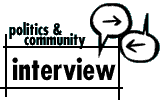
 Anna Fritz
Anna Fritz
Interviewed by William "Upski" Wimsatt
Other Interviews by Upski with Unschoolers:

"At the end of my sophomore year, I was told that I was on my way to becoming valedictorian. When I said that I wanted to drop out, my teachers were like, 'No, no, somebody like you doesn't just drop out of school.'"
Anna Fritz is seventeen years old and her hometown is Milwaukee, Wisconsin.
Tripod: Why did you quit school?
Anna Fritz: In 7th grade, I was having a shitty-ass time, it was terrible. We were thinking about homeschooling but the only option my parents and I found was the "school-at-home" type option. It didn't seem like it would work because my parents would have to be teachers and they worked all day. Plus, being separated from my peers, I wasn't too into that.
Tripod: How did you find out about unschooling?
AF: The way I found out about unschooling, I was at my friend's house. She was unschooled but I didn't understand what it was about, like "what did she did all day?" I saw this book at her house and it was The Teenage Liberation Handbook. She said "Anna, be careful with that." I read the first chapter or two and I was blown away. Once you see the evils of school laid out before you plainly, and learn that there is a practical alternative, you can't help but act on it.
Tripod: How were you doing in school?
AF: At the end of my sophomore year, I was told that I was on my way to becoming valedictorian. When I said that I wanted to drop out, my teachers were like, "No, no, somebody like you doesn't just drop out of school." Yes, we do, and you see that boy over there? (She points to 14-year-old Tim Walsh, a friend of her little brother) I got him to drop out of school too.
Tripod: What were the difficulties?
AF: I had a lot of internal conflicts about whether I could really leave school or not. Somewhere deep inside of me, I knew that I had to take responsibility for my own life. But having been to school for twelve years of my life, there were a lot of schoolish philosophies deeply ingrained. Like You Cannot Succeed Without a High School Diploma. How am I going to do English class? How am I going to know what the accepted interpretation of a novel is? Of course, later on, when I was running my own education, I discovered this really fascinating part of the library called the literary criticism section. And there, I discovered critiques and criticisms from many different angles, of every book worth reading.
My parents said: "If you're serious about this, we want to see a written proposal." I went to the computer and I cranked out this 12-page proposal on every aspect of my education from social studies to the arts, to language to travel. I just covered everything. And for every area, I had a list a mile long of books to read and apprenticeships I wanted to do. And this was only for the first year! It caused a lot of guilt for me that first year because I wasn't living up to these incredibly high expectations I had set. Also, I had that schoolish idea that you have to be busy every moment or else you're not being productive. One hard lesson I learned this year is that you have to just do a lot of sitting and thinking and absorbing before you can really create something remarkable.
My parents and I had a small problem which I kind of expected. My mom was torn between her role as a mother and as the overseer of my education. She was worried because since our schedules were so opposite, she never saw any tangible work getting done. So I got an outside mentor to talk with about the things I was working on.
Tripod: So tell me what you do. Just list everything for me.
AF: I crochet hats. I volunteered in the Milwaukee Public Museum in the greenhouse, the botany department. I practiced my cello. I took lessons from a professor at Madison. I played first chair in a youth orchestra. I make pottery. I'm learning herbal medicine. Actually, I was growing my own herbs and experimenting with their medicinal properties on my dad. He had a cold for weeks and I made him this really foul-smelling drink, this expectorant, and he was better the next day. I also took some photography lessons from my dad.
Tripod: You also do some social justice work.
AF: I work at an organization called Peace Action. I'm running their Peace Voter '96 campaign. We're trying to educate voters about how candidates promise to spend their tax dollars, whether on weapons or human needs. I'm in charge of organizing events, publicity, recruiting volunteers, following candidates' appearance schedules, putting together a voter guide and organizing volunteers to ask questions at candidate forums.
Tripod: How did you get to do this?
AF: In December, Peace Action put me on their steering committee and they decided to send me to Washington for this organizer's meeting. I spoke about youth organizing.
Tripod: And you're also in this professional writing group.
AF: For a few months, I was in a critique group for working poets. Most of them were professional, published poets in their 40s. It was taught by this woman named Debra Vest. She's actually a private writing consultant who gets $60 an hour. I actually began revising my poetry, which I had never done before because I didn't know how to begin.
Tripod: What about your social life?
AF: It's funny, I'm more popular now at my high school than I ever was when I went there.
